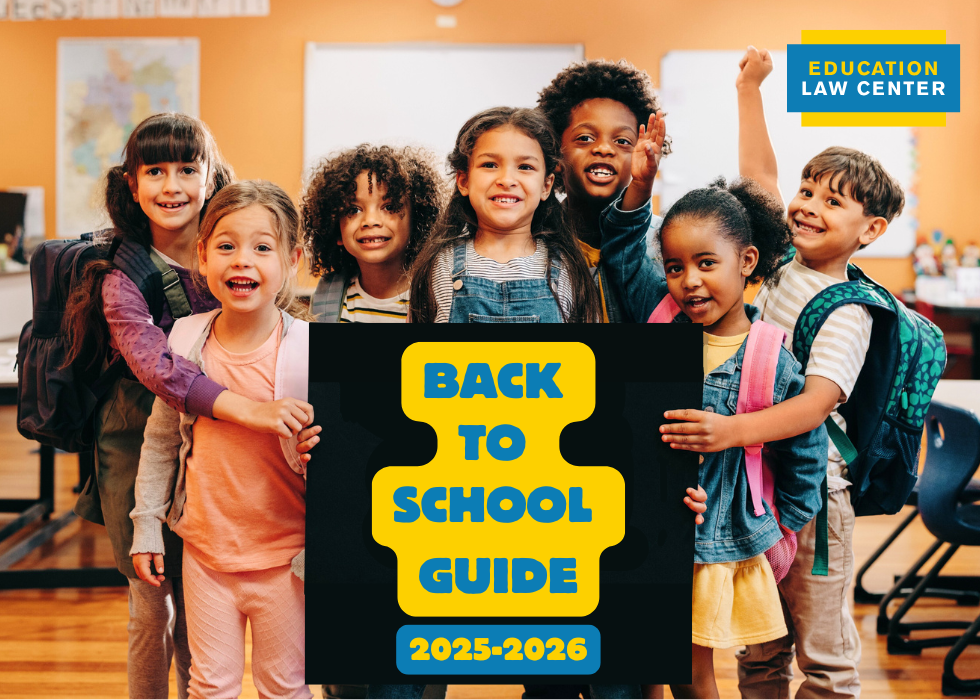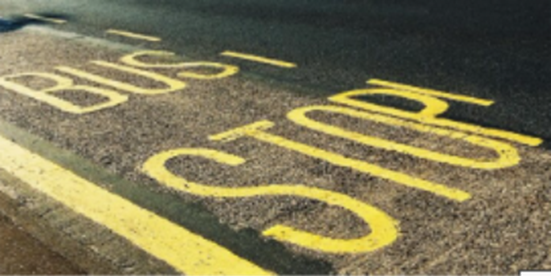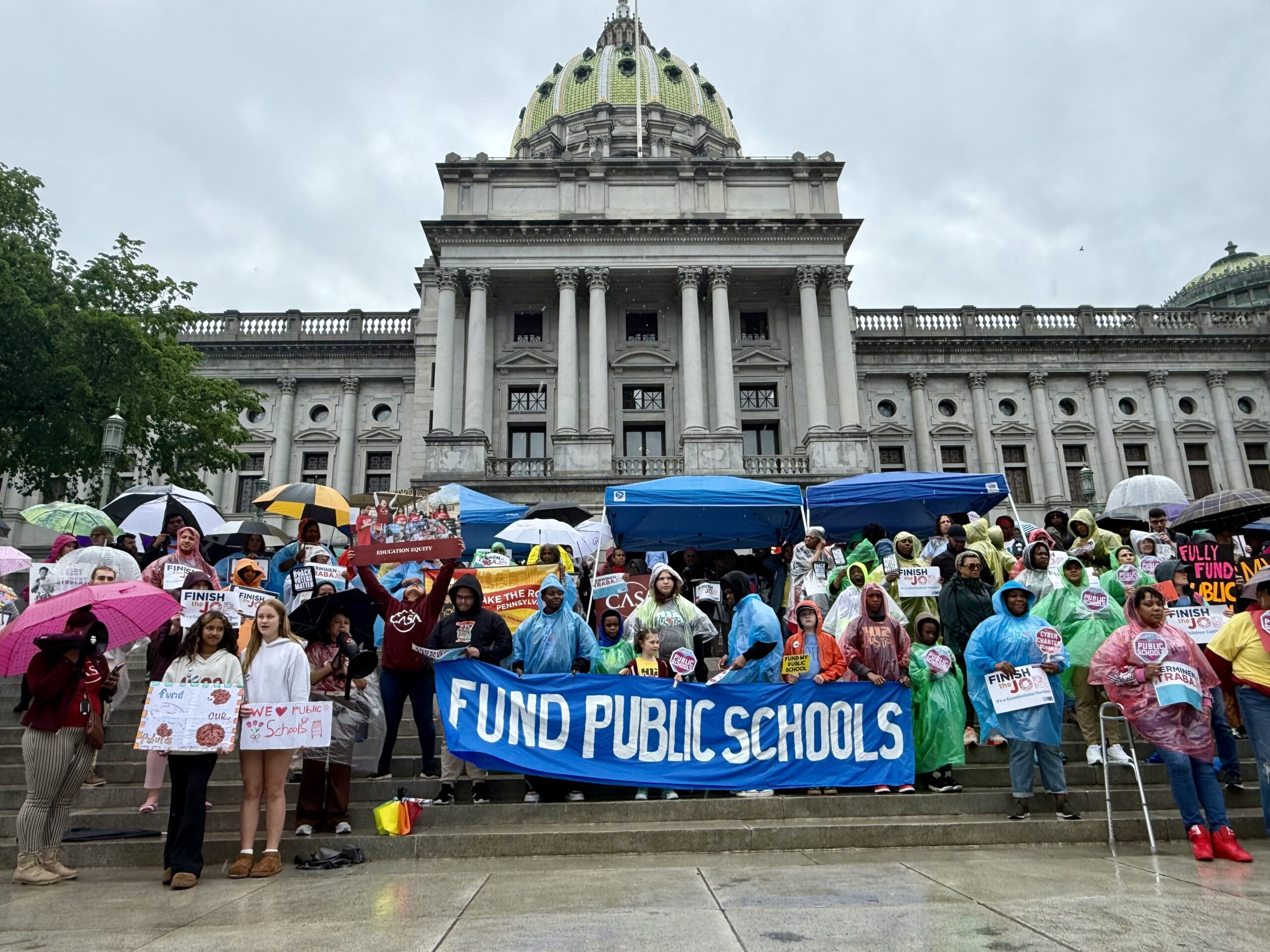
The Education Law Center-PA (ELC-PA) has updated our annual “Back to School Guide” with new publications and updated information on multiple education topics to help students, families, and child-serving professionals.
Click on the topic to jump down to that section.
- What’s New?
- Early Childhood Education
- Student Enrollment
- Addressing Attendance Barriers (Truancy)
- Students with Disabilities
- Students Involved in the Foster Care or Juvenile Justice Systems
- Students Experiencing Homelessness
- Immigrant Students, Multilingual Students, and Their Families
- LGBTQ+ & Gender-Diverse Students
- Affirming and Safe Schools, Free From Racism
- Inclusive Schools and Honest Education
- School Discipline
- Bullying & Harassment
- Credits and Planning for Graduation
- Self-Advocacy Tools
If you have questions about a particular issue at your school, fill out ELC-PA’s online intake form (in English or en español).
You can also leave a message on our Helpline at 215-238-6970 (Eastern and Central PA) or 412-258-2120 (Western PA). Para español, llame al 215-789-2488 (for Spanish speakers, please call 215-789-2488). If you speak a language other than Spanish or English, please know you can still call our main Helpline numbers — we offer interpretation services for most languages.
Translated resources: ELC-PA has translated many of our resources into Spanish (Español), Chinese (中文), Nepali (नेपाली), and Arabic (العربية). Schools, advocates, and parents can also use common school forms translated into several languages from this translation library associated with the Pennsylvania Department of Education.
Click here for a full list of our translated resources.
In addition to understanding the legal rights explained in this guide, you can visit your school district’s website for specific information about how your school educates and supports students. Check your school’s policies to see if students have protections that go beyond the scope of this guide. Check back with us, as we will continue to update our materials throughout the school year.

The Education Law Center-PA (ELC-PA) is a nonprofit legal advocacy organization with offices in Philadelphia and Pittsburgh, dedicated to ensuring that all children in Pennsylvania have access to a quality public education. Through legal representation, impact litigation, community engagement, and policy advocacy, ELC-PA advances the rights of underserved children, including children living in poverty, children of color, children with disabilities, children in the foster care and juvenile justice systems, multilingual learners, LGBTQ+ students, and children experiencing homelessness.
ELC-PA’s publications provide a general statement of the law. However, each situation is different. If you have questions about how the law applies to a particular situation, contact ELC-PA’s Helpline for information and advice or call 215-238-6970 (Eastern and Central PA) or 412-258-2120 (Western PA) ― or contact another attorney of your choice. Para español, llame al 215-789-2488. Or you can fill out an online intake form here.
WHAT’S NEW?
New resources
ELC-PA has updated several fact sheets to reflect changes in the law — and our guide includes new publications on several topics, including: a fact sheet explaining that executive orders and federal directives cannot override legislation, case law, and the U.S. constitution; why diversity, equity and inclusion (DEI) is lawful; a fact sheet on students’ rights during residency disputes; a fact sheet on the rights of preschoolers to learn free from disability discrimination; and more.
Check the “New and Notable” section in each issue area below for more information on what’s new.
State and federal advocacy
ELC-PA is fighting for a state budget that continues to build on investments in educational equity. In February 2023, the Commonwealth Court ruled that Pennsylvania’s school funding system is inequitable, inadequate, and unconstitutional — a landmark decision in the historic case we brought that made clear the state has a legal duty to fix the funding crisis. Last year’s bipartisan agreement to begin closing the adequacy gap was an important first step, but the pace of progress has been far too slow, and this year’s budget delay risks stalling momentum altogether.
As we continue to await the passage of a state budget that, as of September 2, is two months overdue, we urge lawmakers to act now to build on last year’s initial investments to meet the constitutional obligation to adequately fund public schools. Learn more here. Help advocate here. As students return to school, it is imperative that the state fund our public schools!
ELC-PA is pushing back on federal efforts to undermine public education. The new administration has undertaken efforts to dismantle the U.S. Dept. of Education (ED), starve public schools of essential funding that supports our most underserved students, and drastically reduce federal enforcement of anti-discrimination laws.
The administration’s efforts have and will result in significant cuts to federal funding, a lack of federal oversight and enforcement of federal education laws, and the erosion of federal civil rights protections. While no president can eliminate the Department of Education — as this requires an act of Congress — nor erase our students’ statutory and constitutional legal rights, Pennsylvania families rely on the U.S. Department of Education to ensure greater equity in education, distributing a total of $1.6 billion in federal funds annually to our schools.
ELC-PA is partnering with organizations across the country to fight back through advocacy, federal comments, and amicus briefs, as needed. In April, ELC-PA published an action alert and fact sheets to highlight how specific student groups will be affected by federal efforts to eliminate funding and oversight. Use this advocacy toolkit to urge Congress to stop the illegal abuse of executive authority, reject efforts to dismantle ED, and protect vital federal funding needed for our schools. We must work to restore our long-standing federal commitment to educational equity.

EARLY CHILDHOOD EDUCATION
New and Notable
A child’s right to preschool free from discrimination: Early childhood education benefits all children, and every child has a right to attend preschool in Pennsylvania free from discrimination. Yet young children often experience discrimination, which has long-lasting negative effects. Improper enrollment criteria, such as refusing to enroll children in school because they have an IEP or a disability, and discriminatory decision-making often disproportionately exclude Black and Brown children, children experiencing homelessness, multilingual learners, children with disabilities, and children at the intersection of these identities from accessing high-quality preschool programs — even when their right to remain in preschool is protected by law. ELC-PA’s new fact sheet explains children’s right to high-quality, discrimination-free preschool and the protections available to families.
Accessing Early Intervention (EI) services: Early intervention (EI) programs are critical to helping young children with disabilities, including developmental delays, get the services they need. ELC-PA’s updated Early Intervention: Questions and Answers fact sheet has the most up-to-date information on navigating EI programs from birth through school age. Early intervention provides critical support services, including speech therapy, occupational therapy, and behavioral therapy, to ensure that children with disabilities make developmental progress and maintain access to high-quality early childhood education. Learn about the process and your child’s rights and protections.
ELC-PA is a member of a statewide coalition focused on improving access to high-quality early intervention for Pennsylvania’s infants and toddlers (birth to age 3) and their families. The Early Intervention Part C Workgroup seeks to engage a range of diverse stakeholders, including families, to inform our priorities and actions. To help with this effort and stay engaged, please sign up for updates from our workgroup at www.thrivingpa.org.
Fact Sheets and Resources
- Your Child’s Right to Be Free from Discrimination in Preschool [NEW!]
- Early Intervention: Questions and Answers [UPDATED] [Spanish]
- Early Intervention Step-by-Step Guide & Timelines
- Early Childhood Education: Transitioning Through Early Intervention – Birth to School Age
- Your Student’s Right to Compensatory Education
- Your Child’s Right to COVID Compensatory Services
- Preventing Suspension and Expulsion in Preschool Settings [Spanish]
- OCDEL’s Resources for Promoting Inclusion & Reducing Expulsion and Suspension

STUDENT ENROLLMENT
New and Notable
Important protections for students during residency disputes: ELC-PA’s new fact sheet, Students’ Rights During Residency Disputes, provides information on implementing Act 67 of 2024, a state law that ensures school stability for students whose families are involved in residency disputes with their local school district. Data show that school districts target Black and Brown students for school residency challenges, particularly in suburban, predominantly white neighborhoods, due to racial discrimination exhibited by school administrators and community members; this fact sheet offers information about the protections that Act 67 offers. The law also requires schools to consider whether a child is experiencing homelessness and directs districts’ McKinney-Vento liaisons to inform families about students’ rights when experiencing homelessness.
New tools to opt-out of sharing personal information and correct records: ELC-PA has developed model letters for caregivers and students requesting to opt out of disclosing “directory information” (e.g., a student’s address, phone number, etc.) as permitted by the Family Educational Rights and Privacy Act (FERPA), and letters requesting to correct and remove inaccurate or misleading information in education records such as inaccurate student absences (access those tools in the list below).
Fact Sheets and Resources
- How to Enroll a Child in Public School [Arabic]
- How to Enroll a Child Living with Someone Other Than Their Parent
- Rights of Multilingual Caregivers to Enroll Children in School
- Enrollment Complaint Process
- School Immunization Requirements in Pennsylvania
- School Transportation FAQs
- Virtual School Programs and Cyber Charter Schools: What You Need to Know
- Students’ Rights During Residency Disputes: Act 67 Explained [NEW!] [Spanish]
- Act 67 Notice #1 Template: You Have the Right to Attend School If You Are Experiencing Homelessness [NEW!]
- Act 67 Notice #2 Template: Notice of Residency Hearing [NEW!]
- Act 67 Notice #3 Template: Notice of Decision Regarding Right to Attend School [NEW!]
- How to Opt Out of Sharing Personal Student Information (Known As “Directory Information”) [NEW!] [Arabic] [Chinese] [Spanish]
- Self-Advocacy Tool: Directory Information Opt-Out Request (Parents) [NEW!] [Spanish]
- Self-Advocacy Tool: Directory Information Opt-Out Request (Eligible Students) [NEW!] [Spanish]
- Self-Advocacy Tool: Enrollment Complaint Letter
- Self-Advocacy Tool: Sworn Statement by Resident Under § 13-1302
- Self-Advocacy Tool: Education Record Correction Request (Parents) [NEW!]
- Self-Advocacy Tool: Education Record Correction Request (Eligible Students) [NEW!]

ADDRESSING ATTENDANCE BARRIERS (‘TRUANCY’)
New and Notable
Truancy law trainings: This year, ELC-PA conducted multiple trainings for Magisterial District Judges (MDJs), children and youth agencies, and school districts on truancy laws and evidence-based strategies to help students stay in school. These trainings emphasized that schools are best positioned to identify and address the root causes of truancy, such as racism and poverty; the vital role that judges play in connecting families to resources; and why Pennsylvania’s law was amended to limit referrals to court and require MDJs to file citations against either a parent or the student, but not both.
Truancy and foster care placement: Although truancy is a basis for referral to foster care, placement in out-of-home care should be a last resort because it causes significant trauma and long-term negative consequences. In May 2025, ELC-PA and the Pennsylvania Partnerships for Children co-authored a new report, Supporting Success for Pennsylvania’s Students in Foster Care: Data, Outcomes, and Stories from the Field which highlights in part that more than 34% of students in foster care are chronically absent, compared with 22% of their non-foster care peers. These students are highly mobile and need to be supported by school staff to connect with and engage in school. Read our report for more information and policy recommendations.
Fact Sheets and Resources
- Addressing Attendance Barriers (‘Truancy’) & School Attendance – FAQs
- School Attendance and Truancy: Understanding the Basics
- A Judge’s Guide to Attendance Barriers and Act 138
- MDJ Truancy Compliance Checklist
- Self-Advocacy Tools: Attendance Barriers Screeners
- Self-Advocacy Tool: Education Record Correction Request (Eligible Students) [NEW!]
- Self-Advocacy Tool: Education Record Correction Request (Parents) [NEW!]

STUDENTS WITH DISABILITIES
Individual Education Plans (IEPs) and 504 Plans
New and Notable
Preparing for manifestation determinations: Students with disabilities, including those with both IEPs and 504 plans, cannot be excluded from school, either by expulsion or a pattern of suspensions, for behaviors that are caused by their disabilities or result from the school’s failure to follow their IEP or 504 plan. Adult decision-makers’ actions contribute to the disproportionate — and in some cases, illegal — exclusion of Black and Brown students and students with disabilities, and these disparities persist even after controlling for other variables, such as poverty, revealing the central role of racial bias in disciplinary decisions. When a school moves to change the educational placement for a student with an IEP or 504 plan following a disciplinary incident, a school must hold a manifestation determination meeting to consider whether the student’s disabilities impacted the student’s behavior or whether the behavior was the direct result of the school’s failure to implement the child’s IEP or 504 plan. ELC-PA created a new fact sheet and self-advocacy tool to equip parents and advocates with vital information about how to successfully prepare for a manifestation determination.
Eliminating discrimination in preschool: Racially discriminatory attitudes and actions contribute to racial disparities in school discipline in two interconnected ways: discriminatory attitudes against Black and Brown children at the individual level cause teachers to misperceive the behaviors of Black and Brown students to be more intentional or blameworthy when compared with the same behaviors of white peers; and districts are more likely to institute a culture of control and utilize punitive approaches to discipline students when the student body is composed of a majority Black and Brown students, when compared to schools that serve predominantly white students. Black and Brown students with disabilities are disproportionately harmed by school suspensions to their great detriment. See our new fact sheet on the rights of preschoolers to learn free from disability discrimination.
Fact Sheets and Resources
- Your Child’s Right to Be Free from Discrimination in Preschool [NEW!]
- Special Education Evaluations
- Resolving Special Education Disagreements [Arabic]
- Your Student’s Right to Compensatory Education
- Preparing for a Manifestation Determination Review [NEW!] [Spanish]
- Your Child’s Right to COVID Compensatory Services (CCS)
- Alternative Education for Students with Disabilities
- Student Rights in Hospitals
- Developing an IEP Transition Plan
- Accommodating Health Needs in School: 504 Plan
- Right to Compensatory Damages for Disability Discrimination
- Toxic Schools: What Parents Need to Know
- Self-Advocacy Tool: Request for Evaluation to Determine Eligibility for Special Education
- Self-Advocacy Tool: Request for Re-Evaluation
- Self-Advocacy Tool: Request to Convene an IEP Meeting
- Self-Advocacy Tool: Request for an Independent Educational Evaluation (IEE)
- Self-Advocacy Tool: Request for Mediation to Resolve Special Education Disputes
- Self-Advocacy Tool: Request for Due Process to Resolve Special Education Disputes
- Self-Advocacy Tool: Request for Disability-Related Accommodations for Parents/Caregivers
- Self-Advocacy Tool: Preparing for a Manifestation Determination [NEW!]
- Self-Advocacy Tool: Education Record Correction Request (Parents) [NEW!]
- Self-Advocacy Tool: Education Record Correction Request (Eligible Students) [NEW!]

STUDENTS INVOLVED IN FOSTER CARE OR JUVENILE JUSTICE SYSTEMS
New and Notable
New report: Supporting Success for Pennsylvania’s Students in Foster Care: Data, Outcomes, and Stories from the Field. In May 2025, ELC-PA and Pennsylvania Partnerships for Children co-authored a new report analyzing previously undisclosed statewide data, which features the lived experiences of children in foster care and exposes glaring inequities in systemic deficiencies and outcomes. The report offers six key policy recommendations, including ways to improve school stability, reduce the disproportionate use of school discipline against children in foster care, particularly students of color in care who are “subject to more punitive school discipline based on race,” and ensure access to quality schools for children in residential placements. We urge decision-makers and advocates to review this report.
New joint nonregulatory guidance supporting school stability: In November 2024, the U.S. Departments of Education and Health and Human Services jointly published new nonregulatory federal guidance detailing policies and practices local educational agencies (LEAs) should implement to support the educational stability and success of students in foster care and reiterating important requirements schools must follow to comply with the law. This comprehensive guidance covers an expansive set of topics, highlighting the importance of convening best interest determinations (BIDs) no later than three days after a child changes placement or enters care, recommending that children who exit care mid-year be permitted to remain in their school through at least the end of the school year, reminding schools about the importance of including children and their education-decision-makers in BIDs, and clarifying that school stability includes school-stability within feeder patterns.
Supporting PA students in care (Points of Contact): To learn who supports children in care in your school, consult this directory of statewide education contacts for students in foster care. If you are serving in the important role of a Foster Care Point of Contact, consider sharing your expertise on educational stability for students in care by participating in the Center for Schools and Communities’ annual survey, which is open until October 3rd.
NEW education complaint process for students in residential placements: As required by a settlement with state officials in our lawsuit, Derrick v. Glen Mills Schools, the Pennsylvania Department of Education (PDE) launched a new education complaint system for “publicly placed students” in residential facilities, including those in juvenile justice or child welfare placements, detention centers, state prisons, psychiatric hospitals, and other congregate care settings. PDE’s Office of Program Monitoring and Accountability oversees this effort and must respond to complaints by investigating complaints, conducting on-site visits at facilities as needed, and issuing corrective action. To learn more or to file an education complaint, go to PDE’s Publicly Placed Complaint website.
Fact Sheets and Resources
- Rights of Students in Foster Care [UPDATED]
- Educational Rights of Students in the Juvenile Justice System
- Act 1: Supporting Graduation & Equal Access for Students Experiencing Homelessness, in Foster Care, or in the Juvenile Justice System
- Toolkit for Court-Appointed “Educational Decision Makers” (EDMs)
- Blueprint for Change: Education Success for Youth in the Juvenile Justice System
- Supporting Success for Pennsylvania’s Students in Foster Care: Data, Outcomes, and Stories from the Field: [NEW!]
- Self-Advocacy Tool: Best Interest Determination for Children in Foster Care

STUDENTS EXPERIENCING HOMELESSNESS
New and Notable
Federal advocacy Call to Action: The federal administration’s proposed FY2026 budget includes the elimination of the McKinney-Vento funding through a consolidated underfunded block grant with other federal programs. Fortunately, in late July, the U.S. Senate Appropriations Committee voted 26-3 to advance a funding bill with continued dedicated funding for students experiencing homelessness. This is the funding Pennsylvania schools rely on to ensure school stability, support school district homeless liaisons, and increase academic achievement for students. The Senate bill provides funding for other federal early care and education programs targeted for elimination. But the fight is not over. The bill needs support from 60 members in the full Senate, and the House version could be significantly different. Call your federal legislators and urge them to support dedicated federal funding, using talking points from ELC-PA’s fact sheet on the impact of federal action on students experiencing homelessness.
New report from PDE identifies progress and opportunities to better serve students experiencing homelessness: The Pennsylvania Department of Education (PDE) released a new resource in May 2025: Education for Children and Youth Experiencing Homelessness Program 2023-24 State Evaluation Report which disclosed increases in the number of children experiencing homelessness in the 2023-24 school year with 70% of identified students living “doubled-up” for economic reasons. This reality makes it essential that schools are proactively screening all children to ensure that eligible children are promptly identified as required. Black and Brown children continue to be overrepresented among students experiencing homelessness due to systemic and enduring racism across all sectors — in housing, employment, child welfare, and our carceral and education systems — that limit the availability of adequate, affordable, and safe housing in Pennsylvania.
Importantly, more students were able to remain in school until graduation and attend school more regularly in the 2023-2024 school year. Additionally, 85% of identified students received individual supports or services, underscoring the importance of both McKinney-Vento Liaisons and Regional Coordinators. To learn how the McKinney-Vento liaison supports students at your child’s school, see this directory.
Act 1 implementation: This year, more schools have effective supports in place to implement Act 1, which reduces barriers to full participation in school, including eliminating fines and fees and creating new pathways to graduation for students who experience homelessness. The Center for Schools and Communities created a new landing page for schools and communities to learn more about Act 1 and better support eligible students. Learn more about Act 1 in ELC-PA’s fact sheets below.
Fact Sheets and Resources
- The Rights of Students Experiencing Homelessness [Spanish]
- Act 1: Supporting Graduation & Equal Access for Students Experiencing Homelessness, in Foster Care, or in the Juvenile Justice System
- McKinney-Vento and Act 1 Eligibility Screener
- Self-Advocacy Tool: Enrollment Complaint Letter
- Students’ Rights During Residency Disputes: Act 67 Explained [NEW!] [Spanish]
- How to Opt Out of Sharing Personal Student Information (Known as “Directory Information”) [NEW!] [Arabic] [Chinese] [Spanish]
- Self-Advocacy Tool: Directory Information Opt-Out Request (Parents) [NEW!] [Spanish]
- Self-Advocacy Tool: Directory Information Opt-Out Request (Eligible Students) [NEW!] [Spanish]

IMMIGRANT STUDENTS, MULTILINGUAL STUDENTS, AND THEIR FAMILIES
New and Notable
Upholding the rights of immigrant students and keeping ICE out of public schools: Following the federal administration’s executive order rescinding the “sensitive locations” policy that barred Immigration and Customs Enforcement (ICE) from conducting enforcement actions at schools, playgrounds, and bus stops, ELC-PA and its partners have created timely resources on the rights of immigrant students in schools. Check out ELC-PA and ACLU-PA Guidance for Schools and Families Concerning Immigration Enforcement: a letter to all school districts in Pennsylvania and a recorded webinar on the “Legal Rights of Immigrant Students in Pennsylvania Schools.” These resources outline immigrant students’ rights, including enrollment, non-discrimination protections, and how schools should respond to ICE. These resources also provide recommended board policies and building protocols. Parents and community members can advocate for Welcoming Schools policies or resolutions, and request a Welcoming Schools toolkit developed by The Pennsylvania Immigration Coalition (PIC) by contacting ELC-PA’s Helpline.
Schools cannot require documents only U.S. citizens may have (e.g. birth certificate, passport, or social security card) or inquire into immigration status: In April 2025, the Pennsylvania Department of Education (PDE) issued new guidance reminding local education agencies (LEAs) that Plyler v. Doe found that all children, regardless of actual or perceived immigration status, have an equal right to a free public education in the United States. PDE also underscored that state law, 22 Pa. Code § 11.11, instructs schools that they are “not legally permitted to inquire about a child’s or parent’s immigration status during the admission process.” If this occurs, it should be reported to ELC-PA and PDE. Learn more about how to file an enrollment complaint with PDE here.
New tool to opt-out of sharing personal information: Parents and guardians have the right to request that their school not share their student’s “directory information” which often includes a student’s name, address, place of birth and more. To keep their information private, guardians must complete an opt-out form provided by their school or the form attached to this explainer, How to Opt-Out of Sharing Personal Student Information (known as “directory information”).
DOJ guidance on language access rescinded, but school obligations remain: Recently, the federal administration rescinded 2015 Lau guidance which detailed the responsibilities of state and local education agencies to identify, assess, and serve English Learners to ensure their equal access to curriculum and achieve English proficiency. Rescinding this guidance has no effect on the rights of English Learners to be fully included in schools, receive effective language instruction, and receive special education services if needed. These rights emanate from federal law such as Title VI, the IDEA, and the Equal Education Opportunities Act as well as Supreme Court and federal court precedent.
Translated resources: ELC-PA has translated many of our resources into Spanish (Español), Chinese (中文), Nepali (नेपाली), and Arabic (العربية). Schools, advocates, and parents can also use common school forms translated into several languages from this translation library associated with the Pennsylvania Department of Education.
Click here for a full list of our translated resources.
Fact Sheets and Resources
- Immigrant Students and Families Have Important Rights in School [NEW!]
- Rights of Multilingual and Culturally Diverse Students and Families
- Rights of Multilingual Caregivers to Enroll Children in School
- ELC-PA and ACLU Share Guidance for Schools and Families Concerning Immigration Enforcement (webinar and public letter)
- How to Opt Out of Sharing Personal Student Information (Known as “Directory Information”)[NEW!] [Arabic] [Chinese] [Spanish]
- Self-Advocacy Tool: Directory Information Opt-Out Request (Parents) [NEW!] [Spanish]
- Self-Advocacy Tool: Directory Information Opt-Out Request (Eligible Students) [NEW!] [Spanish]
- Self-Advocacy Tool: Request for Translation and Interpretation Services
- The Right to be Free from Bullying and Harassment [Spanish]
- The Right to Be Free From Racism at School
- Alternative Education for Multilingual Learners

LGBTQ+ AND GENDER-DIVERSE STUDENTS
New and Notable
Extremists continue to attack the rights of LGBTQ+ students at the federal, state and local levels, and ELC-PA continues to fight to protect and advance the rights of LGBTQ+ students. Despite the intensifying political attacks and legal challenges in courts, LGBTQ+ students still have rights in our public schools. Read more about ELC-PA’s call for equitable access to sports and the state of the law, including a recent win in Pennsylvania federal court. More comprehensive updates about transgender students’ rights are included in this updated fact sheet about the rights of LGBTQ+ students and recorded webinar, The Truth About Executive Orders and the Rights of Transgender Students in Pennsylvania’s K-12 Schools. If your school is not affirming, contact ELC-PA’s Helpline for advice and support.
U.S. Supreme Court allows religious opt out of LGBTQ+ storybooks: ELC-PA has published a new fact sheet on a recent Supreme Court case, Mahmoud v. Taylor, 606 U.S. –, 145 S.Ct. 2332 (2025), holding that public school parents with a religious objection may opt out their children from books or lessons that include LGBTQ+ characters or themes. This is a right that already existed in Pennsylvania. ELC-PA explains why this holding must be applied narrowly while ensuring that schools uphold their continuing obligations and students’ rights are respected.
Title IX rule updates: Title IX is the federal law that prohibits discrimination on the basis of sex in public schools. New rules under Title IX that were published in 2024 that had explicitly named gender identity and sexual orientation as covered under Title IX were rescinded in court and revoked by the federal administration. Schools have continuing obligations to prevent and respond to sex-based harassment and discrimination under Title IX case law, the 2020 Title IX rule, and Pennsylvania anti-discrimination law. [Check back this fall for ELC-PA’s forthcoming resource Challenging Sex or Gender-Based Harassment at School: Student Rights & Complaint Options.]
Schools cannot require birth certificates to ‘prove’ a student’s sex: Some school districts have implemented new policies requiring students to provide a birth certificate to prove their sex for enrollment and participation in sex-segregated activities. There is no basis in law for this, and it should be reported to ELC-PA and the Pennsylvania Department of Education. Learn more about how to file an enrollment complaint with PDE here.
Fact Sheets and Resources
- The Rights of LGBTQ+ and Gender-Diverse Students [UPDATED]
- Equity in School Sports for Transgender, Gender-Diverse, and Intersex Students [UPDATED]
- Schools Must Allow Opt-Out of LGBTQ+ Storybooks For Religious Objections: Mahmoud v. Taylor Explained [NEW!]
- The Truth About Executive Orders and the Rights of Transgender Students in Pennsylvania’s K-12 Schools (recorded webinar)
- Challenging Sex or Gender-Based Harassment at School [UPDATING FOR FALL RELEASE]
- How to File a Complaint to the Pennsylvania Human Relations Commission [UPDATED]
- Challenging Book Bans: What You Can Do
- See also the Inclusive Schools and Honest Education section below.

AFFIRMING & SAFE SCHOOLS FREE FROM RACISM
New & Notable
Federal attacks on DEI: Through multiple executive orders, a February 14, 2025 Dear Colleague Letter (“DCL”) and selective enforcement by a newly understaffed Office of Civil Rights, the administration has misstated governing law, threatened school districts with unlawful action, and sought to undermine and eliminate effective evidence-based diversity, equity, and inclusion (DEI) practices in K-12 public schools. While the administration has claimed that DEI is “illegal,” multiple district courts have issued preliminary injunctions prohibiting the enforcement of these executive orders, the DCL, and other federal guidance from this administration as legally flawed and unconstitutional. Most recently, a federal judge struck down two of the administration’s attempts to eliminate DEI at schools and universities.
These executive actions cannot erase the rights of students and legal obligations of public schools and school boards to ensure safe and affirming schools under Title VI, state and local anti-discrimination laws such as the Pennsylvania Human Relations Act (PHRA), and federal and state constitutions. Hostile learning environments that severely harm students and open districts to legal liability are created by deliberate indifference to racism and unaddressed bullying and harassment.
ELC-PA has prepared new materials and updated existing fact sheets to explain that executive orders and federal directives cannot override legislation, case law, and the U.S. constitution; why DEI is lawful; and the importance of upholding the rights of Black and Brown students. Read ELC-PA and ACLU-PA’s joint letter sent to all Pennsylvania’s school superintendents in March 2025, and our analysis on the impact of federal actions on PA students. If you or your child is facing racial or sex-based discrimination in a public school, please contact ELC-PA’s Helpline and join our advocacy efforts to ensure inclusive and welcoming schools through Pennsylvanians for Welcoming and Inclusive Schools (PA-WInS).
Fact Sheets and Resources
- Diversity, Equity, and Inclusion: Legal Requirements and Lawful DEI in Public K-12 Schools [NEW!]
- The Right to Be Free From Racism at School
- Promising Practices to Build Antiracist and Affirming Schools
- How to Create Equitable Codes of Conduct [NEW!]
- The Right to Be Free From Bullying and Harassment [Spanish]
- Self-Advocacy Tool: Request for Bullying and Harassment Investigation
- Self-Advocacy Tool: Bullying or Harassment Complaint Form Checklist
- How to File a Complaint to the Pennsylvania Human Relations Commission [UPDATED]
- Online and Hybrid Learning: An Equity Checklist for Schools
- We Need Supportive Spaces that Celebrate Us: Black Girls Speak Out About Public Schools
- We Need Supportive Spaces that Celebrate Us: Black Girls Speak Out About Public Schools (A Companion Guide to the 2023 Report)
- ELC-PA and ACLU-PA Joint Letter to All Pennsylvania School District Superintendents Regarding PA Public Schools’ Rights and Responsibilities in Response to U.S. Dept. of Education’s Dear Colleague Letter [NEW!]

INCLUSIVE SCHOOLS AND HONEST EDUCATION
New and Notable
Unlawful federal executive actions and extremists at the local level have continued unprecedented attacks against LGBTQ+ students and sought to undermine students’ right to learn in affirming school environments with an opportunity to read diverse books. Despite the harmful messaging of executive orders and actions attacking our public schools, federal and state anti-discrimination laws and case law cannot be overruled by executive orders or agency guidance (see ELC’s new explainer).
U.S. Supreme Court rules schools must allow religious opt-out for LGBTQ+ storybooks: Curriculum remains a local and state-level decision, and teaching accurate history — including learning about past and present racial discrimination and literature that reflects the lives of LGBTQ+ people — is imperative to preparing students for a multicultural world. At the same time, Pennsylvania law already allows parents to opt their children out of classroom instruction that conflicts with their religious beliefs. A recent decision from the U.S. Supreme Court in the case Mahmoud v. Taylor clarified that parents have the right to notice and opt out if their child’s elementary classroom is using storybooks with LGBTQ+ characters in conflict with their religious beliefs. Read more about what this means for Pennsylvania public schools in ELC’s analysis.
Transgender students’ rights: Extremists at federal, state, and local levels continue their concerted effort to undermine the right of trans children to be called by their correct name and pronouns, access the bathroom while at school, and participate in sports. Read more about ELC-PA’s call for equitable access to sports and the state of the law, including a recent win in Pennsylvania federal court. More comprehensive updates about transgender students’ rights are included in this fact sheet and recorded webinar, The Truth About Executive Orders and the Rights of Transgender Students in Pennsylvania’s K-12 Schools.
Parents advocating for inclusive schools statewide: ELC-PA continues to fight against school board policies excluding transgender students from school, book bans, and other policies that create hostile school environments for LGBTQ+ students and Black and Brown students. ELC-PA co-founded a statewide coalition, Pennsylvanians for Welcoming and Inclusive Schools (PA-WInS), that has become a strong community of parent advocates supporting each other and standing up for our students across the state. Check out the coalition’s resources about fighting book ban policies, and join the group for advocate meetings and additional resources.
Fact Sheets and Resources
- Schools Must Allow Opt-Out of LGBTQ+ Storybooks For Religious Objections: Mahmoud v. Taylor Explained [NEW!]
- Equity In School Sports For Transgender, Gender-Diverse, And Intersex Students [UPDATED]
- Transparency in Schools: Sunshine Act & Right-to-Know Law [UPDATED]
- The School Board, Its Power, and How to Advocate [UPDATED]
- The Rights of LGBTQ+ and Gender-Diverse Students [UPDATED]
- Challenging Book Bans: What You Can Do
- The Right to Be Free From Bullying and Harassment [Spanish]
- The Right to Be Free From Racism at School
- Promising Practices to Build Antiracist and Affirming Schools
- Students’ Right to Free Speech and Expression in Public Schools
- How to File a Complaint to the Pennsylvania Human Relations Commission [UPDATED]

SCHOOL DISCIPLINE
New and Notable
Stemming the school-to-prison pipeline by adopting equitable codes of conduct: Codes of conduct or student handbooks play a central role in determining student exclusions from the classroom. The use of discriminatory and subjective language fuels racial disproportionality and may create hostile environments for Black and Brown students, LGBTQ+ students, English learners, immigrant students, and students with disabilities. ELC-PA urges school boards to not only comply with legal requirements but also use equity-centered, affirming practices when adopting their codes of conduct to create welcoming and positive school climates for all students. Learn more in our new fact sheet, How to Create Equitable and Affirming Codes of Conduct. Also see related updates to our fact sheets on Transparency and School Board Authority.
Preparing for a manifestation determination review: Students with disabilities cannot be excluded from school, either by expulsion or a pattern of suspensions, for behaviors that are caused by or related to their disabilities, or a school’s failure to implement their IEP. When a school moves to change the educational placement for a student with an IEP or 504 plan following a disciplinary incident, a school must hold a manifestation determination meeting to consider whether the student’s disabilities impacted the student’s behavior, and whether the behavior was related to their disability or a school’s failure to follow the child’s IEP. This tool helps parents and advocates prepare for manifestation determination meetings.
New Tools: ELC-PA created two new Self-Advocacy Tools to help caregivers and students request that suspensions be removed (expunged) from a student’s education record and identify possible rights-violations to challenge a school’s actions.
Fact Sheets and Resources
- Suspensions in Pennsylvania
- Expulsions in Pennsylvania
- Suspension & Expulsion Toolkit [Spanish]
- Preventing Suspension and Expulsion in Preschool Settings [Spanish]
- Preparing for a Manifestation Determination Review [NEW!]
- Alternative Education for Disruptive Youth (AEDY)
- Alternative Education for Students with Disabilities
- Alternative Education for Multilingual Learners
- Weapons at School: Student Rights and Disciplinary Consequences (Act 26)
- Student Rights to Free Speech and Expression in Public Schools
- The Rights of LGBTQ+ and Gender-Diverse Students
- The Right to Be Free From Racism at School
- How to Create Equitable and Affirming Codes of Conduct [NEW!]
- Self-Advocacy Tool: Suspension Expungement Request (Eligible Student) [NEW!]
- Self-Advocacy Tool: Suspension Expungement Request (Parent) [NEW!]
- Self-Advocacy Tool: Preparing for a Manifestation Determination [NEW!]

BULLYING AND HARASSMENT
New and Notable
Bullying and harassment based on race, national origin, disability, religion, sex, sexual orientation, and gender identity continue to be persistent, unaddressed problems in districts across the state.
PHRC Guidance about harassment investigations. In August 2025, the PA Human Relations Commission published new guidance to schools and families describing how it evaluates complaints of harassment in schools. The guidance provides examples and best practices, and explains the standard for a school’s liability if they knew or should have known of severe or pervasive and regular harassment of students but failed to take actions reasonably calculated to end the mistreatment.
Title IX rule updates: Title IX is the federal law that prohibits discrimination on the basis of sex in public schools. New rules under Title IX published in 2024 had explicitly named gender identity and sexual orientation as covered under Title IX, but these rules were rescinded in court and revoked by the federal administration. Importantly, schools still have continuing obligations to prevent and respond to sex-based harassment and discrimination under Title IX case law, the 2020 Title IX rule, and the Pennsylvania Human Relations Act, with regulations explicitly covering gender identity and sexual orientation.
Dramatic Cuts at the Office of Civil Rights Impact Complaint Options: In March 2025, the federal administration laid off over 50% of the staff of the U.S. Department of Education and closed seven regional offices of the Office of Civil Rights (OCR) (including Philadelphia) which investigates complaints of discrimination in public schools. The layoffs and office closures have been challenged in court and the administration has recently represented that it will comply with a federal district court order to reinstate staff, but the reopening of offices is unclear. From March to August 2025, OCR reported receiving 7,231 complaints but there is a dramatic decrease in the ability of staff to process complaints. Additionally, the administration’s executive actions misstate legal requirements governing discrimination and harassment on the basis of race, gender, or national origin. At this time, ELC-PA urges families impacted by identity-based harassment or discrimination in school to submit complaints to the Pennsylvania Human Relations Commission (PHRC). Follow this updated explainer or contact ELC-PA’s Helpline for support: How to File a Complaint with the PHRC.
The Right to be Free from Religious Discrimination: ELC-PA will soon issue a new fact sheet providing an overview of student rights to exercise religious beliefs in schools. Although discrimination based on one’s religion is illegal under federal and state law, attacks based on religious beliefs persist both inside and outside public schools across the Commonwealth. Our forthcoming resource defines religious discrimination, provides example scenarios and an overview of students’ and families’ rights to religious accommodations, and informs families about their options to raise formal challenges.
ELC-PA’s quick reference fact sheet explaining what parents, guardians, and students can do to address bullying and harassment is available in Spanish (español) and Chinese (中文). (Updated versions coming soon.)
Fact Sheets and Resources
- The Right to Be Free From Bullying and Harassment [Spanish]
- Cyberbullying
- How to File a Complaint with the PHRC [UPDATED]
- PHRC’s Guidance on Evaluating Claims of Harassment in Schools under PHRA
- The Right to Be Free From Racism at School
- The Rights of LGBTQ+ and Gender-Diverse Students [UPDATED]
- Rights of Pregnant and Parenting Students [UPDATING—COMING THIS FALL]
- Challenging Sex or Gender-Based Harassment at School: Student Rights & Complaint Options [UPDATING—COMING THIS FALL]
- The Right to be Free from Religious Discrimination [FORTHCOMING THIS FALL]
- Self-Advocacy Tool: Request for Bullying or Harassment Investigation
- Self-Advocacy Tool: Bullying and Harassment Complaint Form Checklist

CREDITS AND PLANNING FOR GRADUATION
New and Notable
Act 1 implementation: The Pennsylvania Department of Education (PDE) debuted a new website in 2025 where you can find more information about Act 1 eligibility and school requirements, submit a question, and find other helpful resources about Act 1, such as digital trainings and informational flyers. (Act 1 is a state law that ELC-PA helped draft and get signed into law in 2022, which remedies credit transfer and graduation barriers faced by highly mobile youth.)
As more schools have received training on Act 1, they are effectively providing new supports for students who experience homelessness or who are in the foster care or juvenile justice systems and who experience at least one school move in a year. Notably, many districts and charter schools have extended this law to apply to other student cohorts such as students who are pregnant and parenting, students who are immigrants, and other highly mobile students. Research indicates that children of color in Pennsylvania communities and across the nation are more likely to experience homelessness, come into contact with the child welfare or juvenile justice systems, and remain in these systems for extended periods of time due to deeply entrenched systemic racism and discrimination. Under Act 1, schools must accept credits already recognized by a prior school and may work with a student to develop a new pathway to graduation. See related resources linked below.
Affinity graduation programs are lawful: Despite the federal administration’s inaccurate assertion that all DEI is illegal (debunked in this webinar and fact sheet), affinity graduation programs that celebrate the graduation of students of a particular identity remain lawful so long as they are open to all students. See this explainer from the Leadership Conference Education Fund: Affinity Graduations – A Mosaic of Educational Achievement.
Fact Sheets and Resources
- Graduation Requirements in Pennsylvania
- Act 1: Supporting Graduation & Equal Access for Students Experiencing Homelessness, in Foster Care, or in the Juvenile Justice System
- View a recorded webinar on implementing Act 1 produced by ELC-PA and Juvenile Law Center
- View a recorded training created by PDE on Act 1
- PDE’s guidance for Act 1 of 2022: Supporting Graduation For Students Experiencing Education Instability
- Act 1 Point of Contact Checklist
- Tips and Best Practices for Act 1 Points of Contact: Lessons from Youth with Lived Experience
- Act 1 Self-Advocacy Tool: Request for Assignment of an Act 1 Point of Contact
- Act 1 Self-Advocacy Tool: Request for Credit Assessment and Graduation Plan
- Act 1 Self-Advocacy Tool: Request to Participate in a School-Sponsored or Extracurricular Activity
- Act 1 Self-Advocacy Tool: Request to Eliminate Fines or Fees
- Act 1 Self-Advocacy Tool: Request for Act 1 Graduation Support Retroactive to School Year 2021-2022
- Developing an IEP Transition Plan

SELF-ADVOCACY TOOLS
ELC-PA created a series of fillable self-advocacy tools for eligible students, parents, guardians, educational decision-makers (EDMs), surrogate parents, and advocates to address some of the most common barriers to school success. You will find them referenced in the sections above. Each tool is free to use; most are fillable forms.
To learn more about specific education rights students have across a variety of topic areas, please review the sections above and see the fact sheet section of our website.
Resources
Enrollment
- Self-Advocacy Tool: Enrollment Complaint Letter
- Self-Advocacy Tool: Sworn Statement by Resident Under § 13-1302
- Self-Advocacy Tool: Education Record Correction Request (Eligible Students) [NEW!]
- Self-Advocacy Tool: Education Record Correction Request (Parents) [NEW!]
- Self-Advocacy Tool: Directory Information Opt-Out Request (Eligible Students) [NEW!] [Spanish]
- Self-Advocacy Tool: Directory Information Opt-Out Request (Parents) [NEW!] [Spanish]
Attendance
- Self-Advocacy Tool: Family Needs Self-Assessment to Address Attendance Barriers
- Self-Advocacy Tool: School Attendance Barriers and McKinney-Vento Screener
- Self-Advocacy Tool: MDJ Screener to Address Truancy Referrals
- Self-Advocacy Tool: Request for Attendance Record Correction
School Discipline
- Self-Advocacy Tool: Suspension Expungement Request (Eligible Student) [NEW!]
- Self-Advocacy Tool: Suspension Expungement Request (Parent) [NEW!]
- Self-Advocacy Tool: Preparing for a Manifestation Determination [NEW!]
Special Education
- Self-Advocacy Tool: Request for Determination of Eligibility for a §504 Plan
- Self-Advocacy Tool: Request for Evaluation to Determine Eligibility for Special Education
- Self-Advocacy Tool: Request for Re-Evaluation
- Self-Advocacy Tool: Request for an Independent Educational Evaluation (IEE)
- Self-Advocacy Tool: Request to Convene an IEP Meeting
- Self-Advocacy Tool: Request for Mediation to Resolve Special Education Disputes
- Self-Advocacy Tool: Request for Due Process to Resolve Special Education Disputes
- Self-Advocacy Tool: Request for Disability-Related Accommodations for Parents/Caregivers [NEW!]
Multilingual Students and Families
McKinney-Vento Eligible Students (Students Experiencing Homelessness)
Students in Care
Addressing Bullying/Harassment
- Self-Advocacy Tool: Request for Bullying/Harassment Investigation
- Self-Advocacy Tool: Bullying and Harassment Complaint Form Checklist
- Fact Sheet: How to File a Complaint With the Pennsylvania Human Relations Commission
Act 1 (access descriptions and links to all our Act 1 self-advocacy tools here)
- Self-Advocacy Tool: Request for Assignment of an Act 1 Point of Contact
- Self-Advocacy Tool: Request for Credit Assessment and Graduation Plan
- Self-Advocacy Tool: Request to Participate in a School-Sponsored or Extracurricular Activity
- Self-Advocacy Tool: Request to Eliminate Fines or Fees
- Act 1 Self-Advocacy Tool: Request for Act 1 Graduation Support Retroactive to the School Year 2021-2022
Happy Back To School!
-September 2025
